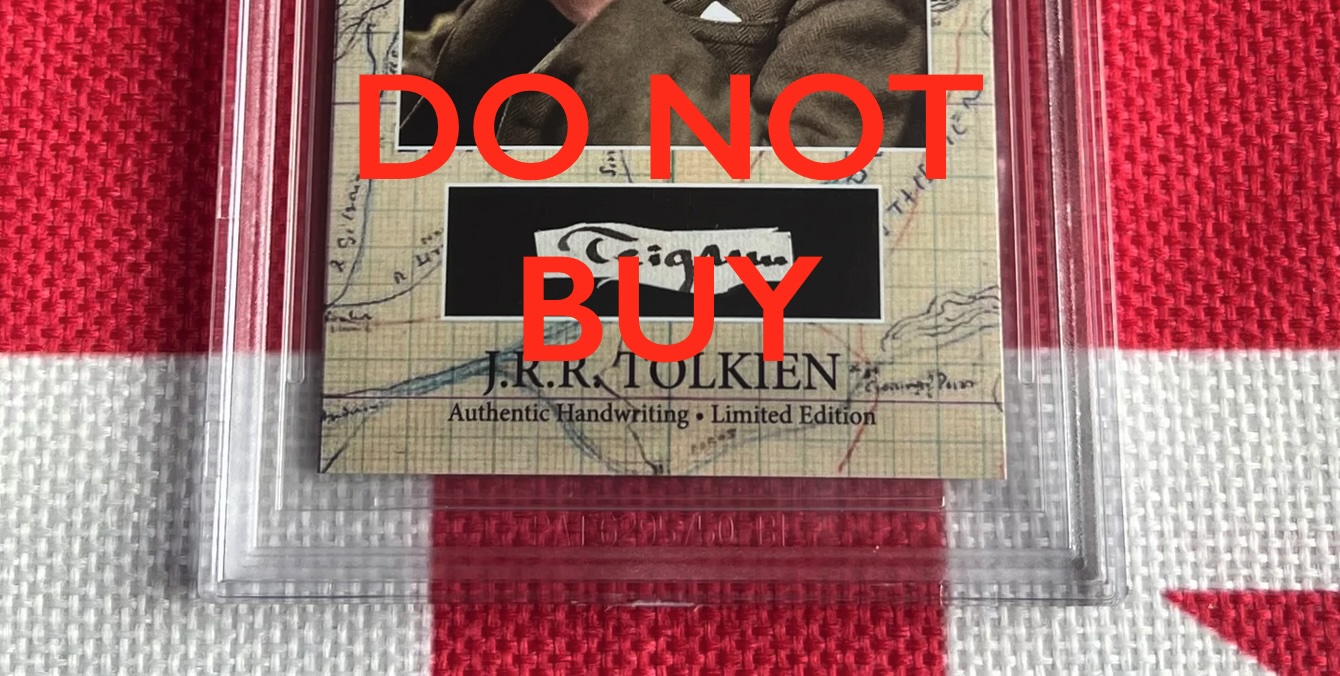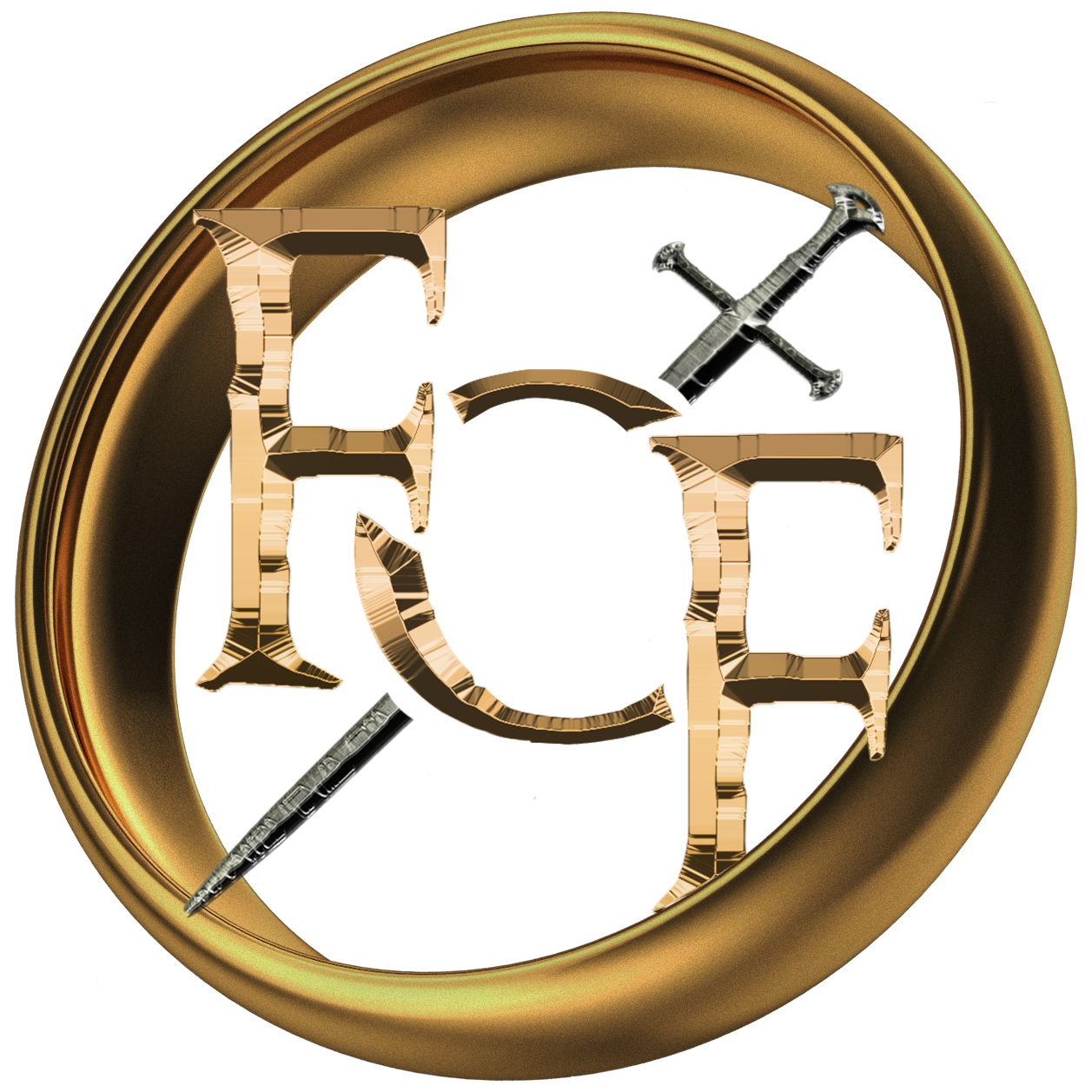
Irrevocable destruction or outright fraud? Selling single “Tolkien words”
Over at the Tolkien Collector’s Guide site (TCG) a user going by the name Aelfwine recently made an astonishing post: there is a company claiming to sell single words “carefully removed” out of a handwritten Tolkien letter (and authenticated, obviously). In fact, the whole business is based around selling single words allegedly from letters by famous historical people in special cases. A single word in this Tolkien set is selling for about US$500, when in reality it is worth much less than that: a single word is meaningless outside the context of the letter it came from, and the sum total of the list price of the words from the letter would far outweigh the price of the original.

They don’t look that “carefully removed” to me
Owning a tiny scrap of paper with ‘&’ written on it by (maybe) Tolkien is perhaps tantalising for fans without the deep pockets to buy an actual letter at auction, but the destruction of the original letter is something that the user Aelfwine found “just so very sad”. Aelfwine is the online handle of Carl F. Hostetter, editor of The Nature of Middle-earth, part of the Elvish Linguistic Fellowship (a group tasked by Christopher Tolkien to edit and publish his father’s linguistic work on constructed languages), and Tolkien handwriting expert. He came across the fragments for sale via his standing eBay alerts for signed Tolkien items.
Hostetter wrote in an email “Unfortunately, we’ve long seen works such as medieval manuscripts, antiquarian atlases, and other artistic volumes being dismembered and their leaves, maps, plates, etc. sold piecemeal; and of course signatures being excised from correspondence (all of which I also find very sad) — but I never imagined this practice would be applied at the absurd level of the individual words of a letter.” The company in question is also selling signatures seemingly cut out of historical documents, and by people of much greater historic impact; George Washington for example. The business also lists letters by Abraham Lincoln, John F Kennedy, and King George III that it has apparently essentially shredded to flog off one word at a time. One Catholic user on TCG was horrified that a letter by the Catholic saint Mother Theresa had been apparently subject to the treatment, considering such a letter is counted as a Relic.
Tolkien’s letters are indeed selling for large sums of money to collectors with the funds to cough up, but they are also an angle of academic research, and also fan interest. Indeed, the TCG have been slowly creating a catalogue of all known Tolkien letters: those published in The Letters of J.R.R. Tolkien, referenced or quoted in other books, those that have come up for auction dating back decades, or are in library collections. Non-public transcriptions, complete or partial, are accompanied by rich public-facing metadata, links to sources and references, and a short summary to aid in those needing to perform research (random recently added example: a personal letter to his grandson Michael George). Turning a letter from an important and beloved author into so much confetti is akin to selling off a famous painting in fingernail-sized scraps of canvas with paint on it (all authenticated, of course). Saying a photo of the painting was still available on the website is no substitute for the real item being kept for posterity.
Jeremy Edmonds (known online as Urulokë), founder of TCG, wrote “The Cut Word Company is destroying important artifacts from multiple authors in pursuit of profit.” He pointed out that it is trivial for someone to practice making copies of a single word until it looks close enough to something known from a letter that has been scanned and listed for auction. Further, that “a single word is impossible to authenticate as it is too small a sample to recognize someone’s unique handwriting or paper material,” His assessment of the worth of a single excised word is stark:
“Even if the sample word is authentic, it has lost all value having been removed from its context and history, encased in plastic (which Tolkien would have abhorred), and including copyrighted material (photograph and Tolkien’s hand-drawn map) without permission. This has zero value as a collectible in my mind, and if any are bought, it will encourage further letters and other important documents to also be destroyed.”
Documentary research of the kind that sometimes is used in Tolkien studies cannot just rely on a photo, or a transcription. Sometimes the paper stock or the ink used is a crucial dating clue—not so much for dated letters, but if other undated manuscripts can be matched to a dated one, it is a gold mine. John Garth, for instance, reshaped our understanding about the dating of the composition of The Book of Lost Tales by noticing a watermark in the paper a draft was written on.
In the same way that the trade of animal products like ivory has been outlawed to suppress the market for hunting that will further deplete the populations of endangered animals, the one way to suppress the practice of destroying valuable historical letters is by starving such a business from sales. Hostetter’s email closed with a similar sentiment to Edmonds’:
“I would hope that no one will want to support such a petty and destructive practice (at any cost, let alone at such exorbitant prices), so that this will backfire financially and prove to be a one-off farce of cynical avarice; but of course the damage in this case is already done, and the destruction irrevocable.”




No Comments